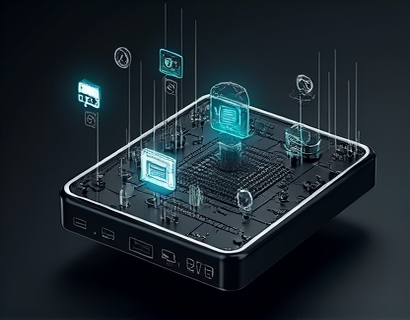AI-Driven Healthcare: Transforming Personalized Medical Support with Advanced Technology
The integration of artificial intelligence (AI) in healthcare is ushering in a new era of personalized medical support. This transformation is not just about enhancing patient care but fundamentally changing how health information is delivered and utilized. AI-driven platforms are at the forefront of this revolution, offering instant, expert-guided solutions and reliable health information. This article delves into the capabilities and potential of AI in healthcare, focusing on how these technologies are empowering individuals to take control of their well-being through data-driven insights and timely assistance.
Understanding AI in Healthcare
AI in healthcare encompasses a broad range of applications, from predictive analytics and diagnostic tools to personalized treatment plans and patient monitoring. The core idea is to leverage machine learning algorithms and natural language processing to analyze vast amounts of medical data quickly and accurately. This capability allows for more precise and personalized medical support, tailored to the unique needs of each individual.
One of the primary advantages of AI in healthcare is its ability to process and interpret complex data sets that would be overwhelming for human practitioners. For instance, AI can analyze medical images with high precision, identifying patterns and anomalies that might be missed by human eyes. This not only improves diagnostic accuracy but also reduces the time required for diagnosis, enabling faster treatment and better patient outcomes.
Personalized Medical Support through AI
Personalized medical support is a cornerstone of modern healthcare, and AI is revolutionizing this aspect by providing tailored recommendations and insights. Unlike traditional one-size-fits-all approaches, AI-driven platforms can analyze an individual's genetic makeup, lifestyle, and medical history to offer customized health advice and treatment plans. This level of personalization ensures that patients receive the most appropriate care for their specific conditions, leading to more effective and efficient health management.
For example, AI can help in creating personalized nutrition and exercise plans based on an individual's genetic predispositions and lifestyle factors. By continuously monitoring health data, these platforms can adjust recommendations in real-time, ensuring that the plan remains effective and relevant. This dynamic approach not only enhances the quality of care but also empowers individuals to take an active role in managing their health.
Real-Time Health Monitoring and Assistance
Real-time health monitoring is another significant benefit of AI in healthcare. Wearable devices and mobile apps equipped with AI algorithms can track vital signs, activity levels, and other health metrics continuously. This constant monitoring allows for early detection of potential health issues, enabling timely intervention and preventing complications.
AI-powered chatbots and virtual assistants are also becoming increasingly popular for providing immediate health advice and support. These tools can answer common health questions, offer guidance on self-care, and even connect users with healthcare professionals when necessary. The convenience and accessibility of these services make them invaluable resources for individuals seeking prompt and reliable health information.
Enhancing Patient-Provider Communication
AI is not only transforming how patients receive care but also how they interact with healthcare providers. Electronic health records (EHRs) enhanced by AI can streamline the sharing of patient information between different healthcare facilities, ensuring that providers have access to comprehensive and up-to-date data. This interoperability improves the continuity of care and reduces the risk of medical errors.
Moreover, AI-driven tools can assist in scheduling appointments, reminding patients of medication doses, and providing follow-up care instructions. These functionalities not only reduce the administrative burden on healthcare providers but also enhance the overall patient experience by making healthcare more accessible and user-friendly.
Data-Driven Insights for Better Health Decisions
One of the most powerful aspects of AI in healthcare is its ability to generate data-driven insights. By analyzing large datasets, AI can identify trends, predict health risks, and provide evidence-based recommendations. These insights are invaluable for both patients and healthcare providers, as they can make more informed decisions about treatment and prevention strategies.
For instance, AI can analyze population health data to identify high-risk groups and tailor public health interventions accordingly. On a personal level, individuals can use AI-driven health analytics to monitor their progress, set realistic goals, and adjust their lifestyle choices based on actionable feedback. This data-driven approach fosters a proactive rather than reactive approach to health management.
Challenges and Ethical Considerations
While the potential of AI in healthcare is immense, it is essential to address the challenges and ethical considerations associated with these technologies. Privacy and security of health data are paramount concerns, as AI systems often require access to sensitive personal information. Ensuring robust data protection measures and compliance with regulations like HIPAA is crucial to maintaining trust and safeguarding patient privacy.
Another ethical consideration is the potential for bias in AI algorithms. If the data used to train these algorithms is not representative or diverse, the resulting recommendations may be skewed, leading to unequal healthcare outcomes. It is imperative for developers and healthcare organizations to prioritize fairness and inclusivity in AI development to avoid exacerbating existing health disparities.
The Future of AI in Healthcare
The future of AI in healthcare is promising, with ongoing advancements poised to further enhance personalized medical support. As AI technologies continue to evolve, we can expect more sophisticated tools for disease prediction, personalized medicine, and remote patient monitoring. The integration of AI with other emerging technologies, such as blockchain and the Internet of Things (IoT), will create even more innovative solutions for healthcare challenges.
Ultimately, the goal of AI-driven healthcare is to empower individuals with the knowledge and tools they need to make informed health decisions. By providing instant, expert-guided solutions and reliable health information, these platforms are transforming the way we approach healthcare, making it more accessible, efficient, and patient-centered. As we move forward, the collaboration between humans and AI will be key to unlocking the full potential of personalized healthcare.










































